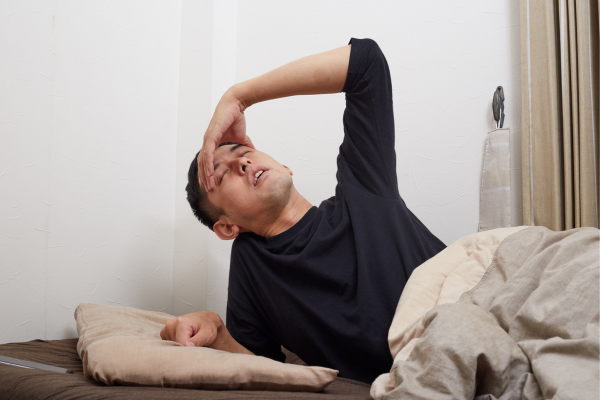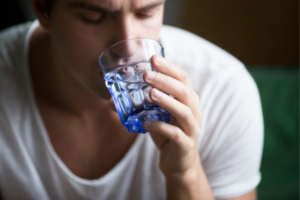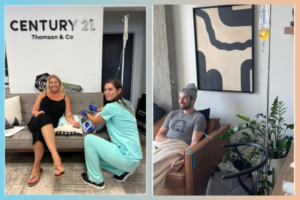
What to Do After a Hangover: The Struggle to Get Back on Track
August 28, 2024
Waking up after a night of overindulgence can be an unpleasant experience. The throbbing headache, the overwhelming fatigue, and the queasiness in your stomach all serve as reminders of the fun you had the night before. Unfortunately, these symptoms can quickly derail your day, leaving you struggling to get back on track. Whether it’s a workday, a family obligation, or just your personal plans, knowing what to do after a hangover is crucial. Finding effective solutions that can help you recover quickly is essential to minimizing the impact of a hangover on your day-to-day life.
Why Quick Recovery After a Hangover is Essential
For many people, life doesn’t stop just because of a hangover. Whether you have a demanding job, family responsibilities, or personal commitments, being sidelined by hangover symptoms is not an option. That’s why knowing what to do after a hangover is so important. Quick recovery is key to ensuring you can meet your obligations and avoid the lingering effects of a night out. With the right strategies, you can bounce back faster and regain your energy, focus, and well-being, allowing you to carry on with your day with minimal disruption.
Understanding a Hangover

What to Do After a Hangover: Understanding the Science Behind It
To effectively tackle what to do after a hangover, it helps to understand what’s happening in your body. A hangover is the result of a complex set of physiological reactions that occur when your body processes alcohol. After drinking, your body works to metabolize the alcohol, which can lead to dehydration, nutrient depletion, and the buildup of toxins like acetaldehyde. This toxic byproduct, combined with the dehydration caused by alcohol’s diuretic effect, contributes to the unpleasant symptoms that define a hangover. Additionally, alcohol can irritate the stomach lining, further exacerbating feelings of nausea and discomfort.
Common Hangover Symptoms: What to Expect and What to Do After a Hangover
When determining what to do after a hangover, it’s helpful to recognize the common symptoms you might experience. These can include:
- Headaches: Often caused by dehydration and the dilation of blood vessels.
- Nausea: Resulting from stomach irritation and the accumulation of toxins in the body.
- Fatigue: Due to the disruption of sleep cycles and the body’s increased energy expenditure in metabolizing alcohol.
- Dehydration: A direct consequence of alcohol’s diuretic effect, leading to thirst, dry mouth, and dizziness.
- Sensitivity to Light and Sound: A result of the nervous system’s heightened sensitivity during recovery.
- Muscle Aches: Caused by dehydration and the depletion of minerals like magnesium and potassium.
Understanding these symptoms helps you know what to do after a hangover, as addressing each symptom directly can significantly speed up your recovery.
This foundation sets the stage for exploring the best strategies and treatments, including mobile IV therapy, to help you recover quickly and effectively after a hangover.
Immediate Steps to Take After a Hangover

Hydrate with Water: The First Step in What to Do After a Hangover
One of the most crucial steps in determining what to do after a hangover is rehydrating your body. Alcohol is a diuretic, which means it increases urine production and leads to dehydration. This dehydration is a major contributor to many hangover symptoms, such as headaches, dizziness, and dry mouth. To combat this, start your day by drinking plenty of water. Aim for at least a couple of glasses as soon as you wake up, and continue to sip water throughout the day. Hydrating properly helps replenish the fluids lost, aiding in quicker recovery and reducing the severity of hangover symptoms.
Eat a Nutritious Breakfast: Fuel Your Recovery After a Hangover

Knowing what to do after a hangover often involves making the right dietary choices. After a night of drinking, your body needs nutrients to kickstart recovery. Eating a nutritious breakfast can help restore the vitamins and minerals that alcohol may have depleted. Foods like eggs, toast, and fruits are excellent choices. Eggs contain cysteine, an amino acid that helps break down acetaldehyde, the toxic byproduct of alcohol metabolism. Whole grain toast provides complex carbohydrates that can stabilize blood sugar levels, while fruits like bananas and berries offer vitamins and antioxidants that support overall recovery. A balanced breakfast can significantly improve how you feel after a hangover.
Rest and Recovery: Give Your Body Time to Heal After a Hangover
One of the simplest yet most effective things to do after a hangover is to allow your body to rest. Alcohol can disrupt your sleep cycles, leaving you feeling fatigued and groggy. Even if you can’t go back to bed, taking it easy for a few hours can make a big difference in your recovery. If possible, spend some time relaxing in a quiet, comfortable environment. Your body needs energy to metabolize the remaining alcohol and restore normal function, so giving yourself permission to rest can speed up the healing process. Remember, rest is a critical part of what to do after a hangover.
Avoid “Hair of the Dog”: Why More Alcohol Isn’t the Answer
When considering what to do after a hangover, it’s important to avoid the temptation of “hair of the dog”—the practice of drinking more alcohol to alleviate hangover symptoms. While it may provide temporary relief, it ultimately prolongs the body’s recovery process. Drinking more alcohol delays the metabolism of the alcohol already in your system, which means your body will continue to experience hangover symptoms for a longer period. Instead of turning to another drink, focus on hydration, nutrition, and rest as healthier and more effective ways to recover from a hangover.
Common Hangover Treatments: What to Do After a Hangover
Over-the-Counter Medications: Managing Hangover Symptoms with Advil and More
One of the most common answers to what to do after a hangover is to reach for over-the-counter pain relievers like Advil or Tylenol. These medications can help alleviate headaches and muscle aches associated with hangovers. Advil (ibuprofen) is a non-steroidal anti-inflammatory drug (NSAID) that reduces inflammation, while Tylenol (acetaminophen) works by blocking pain signals in the brain. However, it’s important to use these medications cautiously, as alcohol can increase the risk of liver damage when combined with acetaminophen and can irritate the stomach lining when combined with NSAIDs. Always follow the recommended dosage and consult with a healthcare provider if you have concerns.
Food and Water: The Role of Proper Nutrition and Hydration in Hangover Recovery
A key aspect of what to do after a hangover is ensuring you’re adequately nourished and hydrated. As mentioned earlier, water is essential for rehydration, but it’s equally important to consume foods that help restore your body’s depleted nutrients. In addition to your nutritious breakfast, consider snacks like yogurt, which provides probiotics to soothe the stomach, and nuts, which offer healthy fats and proteins. Herbal teas, such as ginger or peppermint, can also help calm nausea and settle the stomach. Eating small, frequent meals throughout the day can maintain blood sugar levels and provide sustained energy for recovery.
Sleep and Rest: Why Rest is Essential in What to Do After a Hangover
Sleep is one of the most effective remedies for a hangover. Alcohol can interfere with your sleep quality, leading to feelings of fatigue and sluggishness the next day. When thinking about what to do after a hangover, prioritize getting extra sleep if possible. Even a short nap can help your body recover more quickly. Sleep allows your body to repair and restore itself, processing the toxins from alcohol more efficiently and reducing hangover symptoms. If you’re unable to sleep, try to rest in a calm, quiet environment to conserve energy and promote recovery.
This comprehensive approach ensures that you address all aspects of a hangover, helping you feel better faster and get back to your normal routine.
Advanced Hangover Relief: Mobile IV Therapy
Mobile IV Therapy: The Ultimate Solution for What to Do After a Hangover
When considering what to do after a hangover, traditional remedies like water, food, and rest are important, but they might not always provide the fast relief you need. This is where mobile IV therapy comes into play as a powerful and efficient solution for hangover recovery. Mobile IV therapy allows you to receive tailored treatments right in the comfort of your home or office, eliminating the need to travel when you’re not feeling your best. This service is designed to deliver immediate relief by directly infusing your bloodstream with essential fluids, vitamins, and minerals that help combat the debilitating symptoms of a hangover.
Benefits of Mobile IV Therapy for Hangovers
Rapid Hydration: A Key Step in What to Do After a Hangover
One of the most effective aspects of mobile IV therapy is its ability to provide rapid hydration. Unlike drinking water, which has to be absorbed through your digestive system, mobile IV therapy delivers fluids directly into your bloodstream. This process rehydrates your body much faster, addressing the root cause of many hangover symptoms, such as headaches and dizziness. When you’re thinking about what to do after a hangover, consider mobile IV therapy as a way to quickly restore your body’s fluid balance and get back to feeling normal.
Nutrient Replenishment: Boost Your Recovery After a Hangover
Hangovers deplete your body of essential vitamins and minerals, leaving you feeling drained and fatigued. Mobile IV therapy offers a powerful solution by replenishing these nutrients directly into your bloodstream. The treatment typically includes a combination of Vitamin B-Complex, Vitamin B12, and Magnesium, all of which play a crucial role in restoring energy levels and reducing fatigue. By targeting these deficiencies, mobile IV therapy helps you recover faster and more effectively, making it an ideal choice for what to do after a hangover.
Symptom Relief: Comprehensive Care for Hangover Recovery
When deciding what to do after a hangover, symptom relief is often a top priority. Mobile IV therapy addresses this by offering add-ons like Zofran for nausea and Toradol for headaches and muscle aches. These medications can be included in your IV treatment to provide targeted relief from the most uncomfortable hangover symptoms. The ability to customize your treatment to address specific symptoms makes mobile IV therapy a comprehensive and highly effective option for hangover recovery.
Uplift IV Wellness’s Hangover Lifted Mobile IV Therapy Treatment

Overview of Hangover Lifted Treatment: What to Do After a Hangover with Uplift IV Wellness
Uplift IV Wellness offers a specialized Hangover Lifted treatment that is designed to address all aspects of hangover recovery. This mobile IV therapy includes a blend of essential vitamins and minerals that are tailored to help you bounce back quickly. The treatment features Vitamin B-Complex, which supports energy metabolism; Vitamin B12, known for its energy-boosting properties; and Magnesium, which helps relax muscles and reduce headaches. Additionally, the Hangover Lifted treatment can be customized with add-ons like Zofran, a powerful anti-nausea medication, and Toradol, a non-narcotic pain reliever, to provide comprehensive relief from hangover symptoms.
How It Works: The Convenience of Mobile IV Therapy at Your Home or Office
One of the key benefits of Uplift IV Wellness’s Hangover Lifted treatment is the convenience of mobile service. When you’re figuring out what to do after a hangover, the last thing you want is to travel to a clinic. With mobile IV therapy, a licensed medical professional comes directly to your home or office, bringing the treatment to you. The process is simple: after booking an appointment, a nurse will arrive at your location, set up the IV, and administer the treatment, all while you relax in the comfort of your own space. The entire session typically takes 30 minutes to an hour, making it a quick and efficient solution for hangover recovery.
This advanced approach to hangover relief not only saves you time but also provides the immediate and targeted care you need to feel better fast. If you’re looking for the best solution for what to do after a hangover, Uplift IV Wellness’s mobile IV therapy is a top choice.
Other Long-Term Strategies for Hangover Prevention
Moderate Alcohol Consumption: The First Step in What to Do After a Hangover
One of the most effective ways to reduce the severity of a hangover is to drink alcohol in moderation. When considering what to do after a hangover, it’s essential to recognize that prevention starts with how you consume alcohol. Drinking in moderation not only reduces the likelihood of experiencing severe hangover symptoms but also minimizes the overall impact on your body. The key is to pace yourself, set limits, and be mindful of your alcohol intake. By drinking responsibly, you can enjoy your social experiences without the dreaded hangover the next day.
Stay Hydrated While Drinking: A Simple Strategy for What to Do After a Hangover
Staying hydrated is crucial in preventing hangovers and is a key part of what to do after a hangover to mitigate symptoms. Alcohol is a diuretic, which means it increases urine production and leads to dehydration—a primary cause of hangover symptoms like headaches and dizziness. To counteract this, make it a habit to drink water between alcoholic beverages. For every alcoholic drink, try to have a glass of water. This practice helps maintain your body’s fluid balance, reducing the severity of dehydration and making your hangover recovery easier.
Eat Before and During Drinking: Nutritional Tips for Hangover Prevention
Another important strategy in determining what to do after a hangover is to eat before and during alcohol consumption. Food slows down the absorption of alcohol in your bloodstream, which can help prevent your blood alcohol levels from rising too quickly. Eating a meal rich in carbohydrates, proteins, and healthy fats before you start drinking can create a buffer that protects your stomach lining and moderates alcohol absorption. Additionally, snacking on foods like nuts, cheese, or crackers while drinking can help maintain steady blood sugar levels, further reducing the risk of severe hangover symptoms.
Use Supplements: Proactive Measures for What to Do After a Hangover
Taking supplements is another proactive approach to reducing the severity of hangovers. B vitamins and magnesium, in particular, are known to help mitigate some of the negative effects of alcohol. B vitamins play a crucial role in energy production and neurological function, while magnesium helps relax muscles and reduce inflammation. Taking these supplements before or during a night of drinking can help support your body’s natural defenses against hangover symptoms. Including these in your routine may be a valuable step in what to do after a hangover to ensure a smoother recovery.
When considering what to do after a hangover, combining immediate recovery steps like hydration, nutrition, and rest with long-term prevention strategies, such as moderate alcohol consumption and mobile IV therapy, is key. Uplift IV Wellness’s Hangover Lifted mobile IV therapy offers a convenient and effective way to recover quickly, right from the comfort of your home or office. Don’t let a hangover derail your day—book an appointment with Uplift IV Wellness today and experience rapid relief so you can get back to feeling your best.